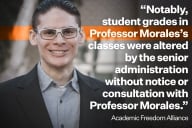You have /5 articles left.
Sign up for a free account or log in.
Educators should not teach only facts and formulas -- they should also teach students how to use that subject knowledge to remain academically motivated, think critically, and communicate ideas to others, according to a report about education and life skills released Tuesday by the National Research Council.
The report -- "Education for Life and Work: Developing Transferable Knowledge and Skills in the 21st Century" -- promotes “deeper learning,” a process through which students learn how, when and why to apply specific situational knowledge to solve problems in other areas within a discipline. This is called “transferable knowledge.”
When students acquire this subject knowledge and the ability to apply it, they have what the report’s authors called “21st-century competencies.” The report identifies three types of skill groups that compose these competencies: cognitive (critical thinking and problem solving), intrapersonal (organization and responsibility), and interpersonal (communication and collaboration).
Although the report focused on promoting these competencies in K-12 education, its findings and recommendations also apply to the higher education sector, where students are arriving from high school unprepared for college -- and often graduating from college still unprepared for further study or employment, said Jim Pellegrino, chair of the Committee on Defining Deeper Learning and 21st Century Skills, which authored the report, in an interview with Inside Higher Ed.
Pellegrino, professor of education at the University of Illinois at Chicago and director of the university’s Learning Sciences Research Institute, said instilling deeper learning approaches and transferable knowledge in college students would be easier if that type of education began in elementary school.
“What we in higher education often complain about is students don’t have these kinds of skills and qualities,” he said, adding that colleges should not blame the K-12 sector but instead look introspectively to create more effective teaching methods as well. “The things that business and education leaders want to have happen in K-12 are the same things companies say about higher education.”
According to the report, curriculums and programs should focus on clear learning goals, and assessments should measure students’ progress toward these goals. Instructors should use examples, connect topics to students’ interests and provide guidance and feedback.
Pellegrino said educators should be clear about the forms of thinking and reasoning they want students to be able to engage in, and they should teach students to reason within disciplines instead of general problem-solving. He said instructors must not focus only on the areas that are easy to teach and assess – such as formulas that can be regurgitated and tested through multiple-choice tests – but teach students a body of knowledge and a way of reasoning within that context.
“The way we assess students is an abomination in higher education,” he said, adding that instead of simply issuing multiple-choice tests, instructors should give students essays and short-answer questions to teach them how to apply facts and formulas to problems across the discipline.
Even though budget cuts continue to plague both public K-12 education and higher education, rendering small classes and extra time to grade papers and short-answer tests scarce, Pellegrino said educators and policy makers must find a way to promote deeper learning. “Our education system is not succeeding in terms of producing well-educated citizens who make it out of high school and through college,” he said. “You’re going to get what you’re willing to pay for.”







